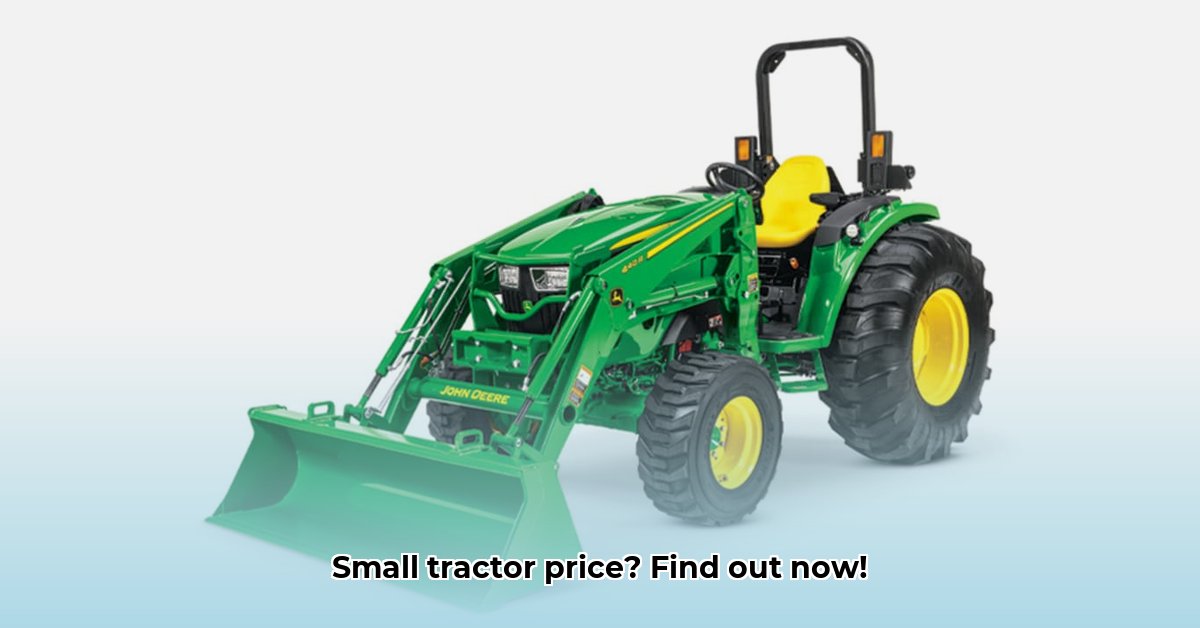
Shopping for a small tractor can be daunting. This comprehensive guide breaks down the costs, helping you make an informed decision. We'll cover new and used tractor pricing, budgeting, and minimizing financial risks. For more detailed cost breakdowns, check out this helpful resource: tractor cost guide.
Understanding Small Tractor Costs: A 2024 Overview
The price of a small tractor varies significantly, ranging from under $10,000 to over $60,000. Several factors influence the final cost:
Key Factors Affecting Tractor Price
- Horsepower: Higher horsepower equals greater capability, but also a higher price. Consider your workload – more demanding tasks require more horsepower. What tasks will your tractor perform? (e.g., mowing, plowing, hauling)
- Features: Luxury features like air conditioning and GPS add substantially to the cost. Prioritize essential features versus nice-to-haves. Does your work require advanced technology?
- Brand: Established brands often command premium prices due to their reputations for quality and reliability. Research different brands to compare features and warranties. What is your budget for a tractor?
- Condition (Used Tractors): A well-maintained used tractor can save money, but poor maintenance can lead to costly repairs. Thorough inspection is crucial before purchasing a used tractor. Have you considered getting a pre-purchase inspection?
New vs. Used Tractors: A Cost-Benefit Analysis
The choice between a new and used tractor depends on your budget and risk tolerance.
| Feature | New Tractor | Used Tractor |
|---|---|---|
| Price | Significantly Higher | Much Lower |
| Warranty | Usually Included | Typically Not Included |
| Reliability | Generally Higher, Predictable Performance | Variable; Depends on Previous Maintenance |
| Maintenance | Lower Initially, Easier to Predict | Potentially Higher; Unknown Repair Needs |
| Resale Value | Better Resale Value over the Short Term | Resale value can be unpredictable |
Key Takeaway: New tractors offer warranty protection and predictable performance, while used tractors offer significant cost savings but higher risk.
Determining Your Tractor Needs: Size and Functionality
Before pricing, assess your needs. How much land do you have? What tasks will the tractor perform? Overestimating your power needs leads to unnecessary expense. "Buy the tractor that fits your needs, not the one that looks cool," advises John Deere expert, Sarah Miller.
Budgeting for Your Tractor Purchase: Beyond the Sticker Price
Tractor costs extend beyond the initial purchase price. Consider:
- Maintenance: Regular maintenance is crucial for longevity and avoiding costly repairs. Does your budget include a 10% annual maintenance fund?
- Fuel: Factor in fuel costs based on your anticipated usage. (Remember fuel prices fluctuate!)
- Insurance: Tractor insurance protects your investment from theft or damage.
- Unexpected Repairs: A contingency fund for unforeseen repairs is essential. Will you set aside 5% of the purchase price for this purpose?
A Step-by-Step Guide to Smart Tractor Shopping
- Assess Your Needs: Define your acreage and tasks to determine horsepower requirements.
- Set a Realistic Budget: Account for purchase price, financing, maintenance, fuel, insurance, and repairs.
- Research Models: Compare tractors from different manufacturers, considering features, horsepower, and reviews.
- Thorough Inspection (Used Tractors): A pre-purchase inspection by a qualified mechanic is crucial for used tractors.
- Negotiate the Price: Negotiation is standard practice when purchasing large equipment.
- Secure Financing: Finalize financing arrangements before committing to the purchase.
- Purchase and Insure: Complete the transaction and obtain comprehensive insurance.
Minimizing Risks: Protecting Your Investment
- Meticulous Inspections (Used Tractors): Avoid costly surprises by having a professional inspection.
- Warranty (New Tractors): A comprehensive warranty provides crucial protection against early failures.
- Preventative Maintenance: Establishing a regular maintenance schedule extends your tractor's lifespan.
- Reliable Parts & Service: Ensure readily available parts and a reliable local service network.
- Emergency Repair Fund: Set aside funds for unexpected repairs.
Remember, buying a small tractor is a significant investment. By following these steps and carefully considering all costs, you'll be well-prepared to make a sound, financially responsible decision.